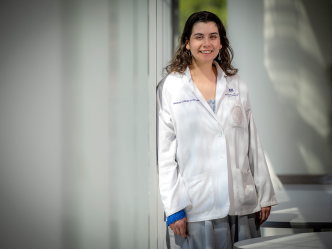1-in-4 adults exceed the safe drinking limits set forth by the National Institute of Alcohol Abuse and Alcoholism. According to the Centers for Disease Control and Prevention, excessive alcohol consumption is linked to more than 60 chronic health conditions and is responsible for nearly 80,000 deaths per year.
But alcohol isn’t the only problem.
The estimated total cost of substance abuse in the U.S. alone amounts to $600 billion annually.
It’s safe to say, then, that substance abuse is a serious problem. However, outside of psychiatry, few health professional training programs pay serious attention to the root of patients’ alcohol or drug abuse.
Dr. Aaron Johnson, associate professor in the Institute of Public and Preventive Health, is looking to change that.
With the aid of a recent grant from the Substance Abuse and Mental Health Services Administration (SAMHSA), Johnson hopes to begin training students in health professional programs to identify and address unhealthy alcohol and drug use in their patients and clients.
One of 62 training grants recently awarded nationwide, the $950,000 grant will afford for the training of more than 1,000 GRU students over the course of the next three years.
“With the introduction of the Affordable Care Act, there is a significantly greater emphasis on prevention and integrated healthcare,” said Johnson. “This training will provide [students] with a skill that addresses both of these issues.”
As a condition of the grant, SAMHSA also requires a series of short satisfaction surveys from grantees. Held immediately following graduation, and again at the 30-day and 12-month mark, the purpose of the surveys is to measure changes in student attitudes toward and confidence in working with substance use patients.
Johnson says GRU’s surveys will go above and beyond SAMHSA’s requirements.
“Once students are trained, we’ll evaluate each students’ proficiency in performing a brief intervention using a computer-based simulated patient,” he said. “That way, all students regardless of the program they are in will be evaluated using the same simulation.
The simulated patient is currently being developed by Kognito.
Johnson said he and his colleagues have also discussed the possibility of using the required surveys to conduct validity research.
“We’d like to compare the proficiency measure using the simulated patient to that of a live standardized patient and/or a preceptor’s direct observation with a real patient,” he said. “We are just beginning to develop that idea, though.”
Johnson said he hopes the training will help distinguish GRU students on both the national and international levels.
“The strongest evidence for the effectiveness of screening and brief intervention is in primary care settings,” he said. “This training enables primary care practitioner to address many alcohol and drug issues right there in the office, while also making them more knowledgeable of treatment options for patients who need formal treatment.”
Not only will the grant affect students, though. Johnson said he believes it will also help distinguish GRU from other regional academic medical centers.
“National studies of physicians and nurses have found that they receive very little in the way of instruction on addressing patients’ substance use issues,” he said. “Integrating this training into their curriculum will make GRU somewhat unique in this regard.”
 Augusta University
Augusta University




